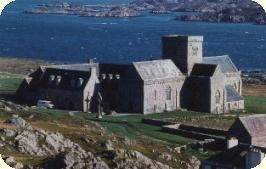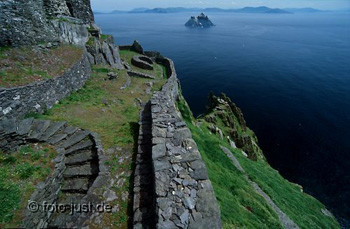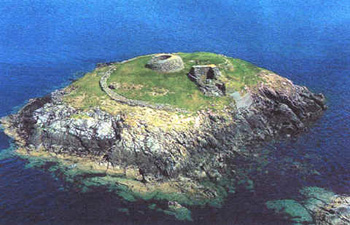"I Am Giving Thee Worship With My Whole Life"
Celtic Prayer as a Guide to Faith
For Sunday May 12, 2013
Lectionary Readings (Revised Common Lectionary, Year C)
Acts 16:16–34
Psalm 97
Revelation 22:12–14, 16–17, 20–21
John 17:20–26
One of Judaism's gifts to the world is its radical monotheism. The psalmist for this week confesses: "You, O Lord, are the most high over all the earth; / you are exalted far above all Gods." The earliest Christians, all of whom were Jews, continued this confession. We read in Acts and Revelation for this week that "the Most High God" is "the Alpha and Omega, the first and the last, the beginning and the end."
 |
Celtic monastery, Iona, Scotland. |
Radical monotheism has its critics among those who believe that it fosters an exclusionary and sometimes violent posture toward what are perceived as false faiths. More popular is some form of pluralism — the belief that no one religion is normative for all people. Pluralism is a radically egalitarian perspective that grants parity and validity to all religions. For the pluralist, radical monotheism is morally repugnant, intellectually untenable, and politically disastrous.
These are important questions. I've explored them in my essay The Only Way to the Only God?
But if we begin with liturgical practices instead of intellectual questions, we might end up in a different place.
Before the early church had a theological creed, a biblical canon, or an intellectual superstructure, it had its liturgical practices — like making the sign of the cross, eucharistic and baptismal traditions, the renunciation of the devil, and prayers of all kinds. Privileging liturgical practice before intellectual inquiry gave rise to an important guideline: lex orandi, lex credendi — "the law of prayer establishes the law of belief." In other words, worship is the source and guide of intellectual inquiry.
I recently enjoyed Esther de Waal's book The Celtic Vision. It's a collection of prayers from the Carmina Gadelica, a six-volume work by the folklorist Alexander Carmichael (1832–1912). Carmichael traversed Scotland's Outer Hebrides isles, visiting over 400 homes, collecting and translating the oral traditions of its simple Gaelic-Catholic people. De Waal arranges the prayers into sixteen categories — birth and death, morning and evening, healing and protection, invocations to bless the land, hunting and herding, farming and fishing.
 |
Skellig Michael, Celtic monastery off the coast of Ireland. |
These Celtic prayers to the "God of all gods" are radically monotheistic and explicitly Trinitarian. And yet, whatever intellectual questions they might raise, in liturgical practice they're also very tender. The prayers for "invocations and good wishes" and "short blessings" are the antidote to violence and exclusion.
They're also simple and yet dignified, homely and eloquent, ordinary and yet sacred. They're a good example of the sensus fidelium or "sense of the ordinary faithful" — that is, the wisdom of everyday Christians, the unlettered rank and file, in contrast to the clerical and theological elite.
Here's one of my favorites.
I believe, O God of all gods,
That Thou art the eternal Father of life;
I believe, O God of all gods,
That Thou art the eternal Father of love.I believe, O God of all gods,
That Thou art the eternal Father of the saints;
I believe, O God of all gods,
That Thou art the eternal Father of each one.I believe, O God of all gods,
That Thou art the eternal Father of all humanity;
I believe, O God of all gods,
That Thou art the eternal Father of the world.I believe, O Lord and God of the peoples,
That Thou art the creator of the high heavens,
That Thou art the creator of the skies above,
That Thou art the creator of the oceans below.I believe, O Lord and God of the peoples,
That Thou art He Who created my soul
and set its warp.Who created my body from dust and from ashes,
Who gave to my body breath,
and to my soul its possession.Father, bless to me my body,
Father, bless to me my soul,
Father, bless to me my life,
Father, bless to me my belief.Father eternal and Lord of the peoples,
I believe that Thou hast remedied my soul in the Spirit
of healing,
That Thou gavest Thy loved Son in covenant for me,
That Thou hast purchased my soul with the precious blood
of Thy Son.Father eternal and Lord of life,
I believe that Thou didst pour on me the Spirit of grace
at the bestowal of baptism.Father eternal and Lord of humanity,
Enwrap Thou my body and my soul beloved,
Safeguard me this night in the sanctuary of Thy love,
Shelter me this night in the shelter of the saints.Thou hast brought me up from last night
To the gracious light of this day,
Great joy to provide for my soul,
And to do excelling good to me.Thanks be to Thee, Jesu Christ,
For the many gifts Thou hast bestowed on me,
Each day and night, each sea and land,
Each weather fair, each calm, each wild.I am giving Thee worship with my whole life,
I am giving Thee assent with my whole power,
I am giving Thee praise with my whole tongue,
I am giving Thee honor with my whole utterance.I am giving Thee reverence with my whole understanding,
I am giving Thee offering with my whole thought,
I am giving Thee praise with my whole fervor,
I am giving Thee humility in the blood of the Lamb.I am giving Thee love with my whole devotion,
I am giving Thee kneeling with my whole desire,
I am giving Thee love with my whole heart,
I am giving Thee affection with my whole sense;
I am giving Thee my existence with my whole mind,
I am giving Thee my soul, O God of all gods.My thought, my deed,
My word, my will,
My understanding, my intellect,
My way, my state.I am beseeching Thee
To keep me from ill,
To keep me from hurt,
To keep me from harm;To keep me from mischance,
To keep me from grief,
To keep me this night
In the nearness of Thy love.May God shield me,
May God fill me,
May God keep me,
May God watch me.May God bring me
To the land of peace,
To the country of the King,
To the peace of eternity.Praise to the Father,
Praise to the Son,
Praise to the Spirit,
The Three in One.
 |
Celtic monastery ruins on Church Island, Valencia, in County Kerry, Ireland. |
These simple words are a sacred act. They're both tender and profound. When we invoke God's blessing, for ourselves or for another person, we're not wishing them good luck, as if someone had sneezed. Rather, in the words of another Celtic blessing, we're commending them to a Father who wants "to do excelling good to us. . . better than we know to ask, / better than we know to ask."
See Esther de Waal, editor, The Celtic Vision; Prayers, Blessings, Songs and Incantations from the Gaelic Tradition (Liguori, MO: Liguori Publications, 2001), pp. 1–4.
Image credits: (1) University of York Chaplaincy; (2) Foto-just at Panoramio; and (3) PrayerFoundation.org.





